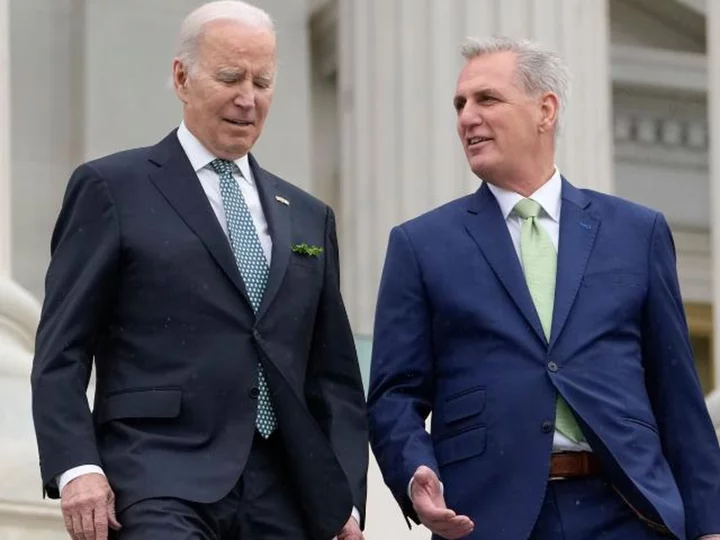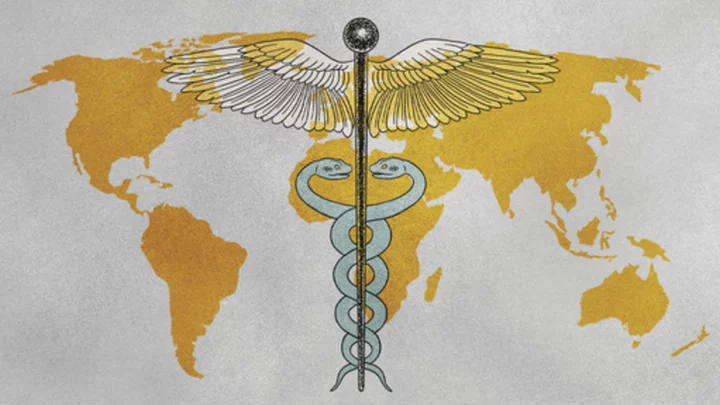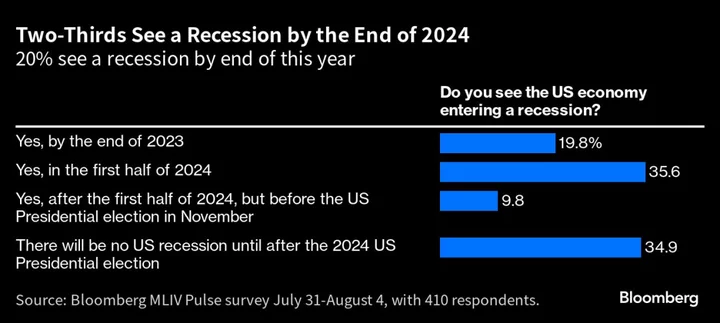The clash between President Joe Biden and House Majority Leader Kevin McCarthy over the US debt will decide who is the most dominant figure in Washington for most of the next two years. And a failure by the two men to come to terms by this time next month would result in a national default that could have a profound impact on the economy and the 2024 election.
While the gravest human impact of a default would be felt by millions of Americans in lost jobs, benefits and an eroded sense of economic security, the showdown is also about power.
The huge stakes explain why a meeting between Biden, McCarthy and other top congressional leaders in the Oval Office on Tuesday is so critical and will be watched worldwide.
It represents a fateful moment in the apparently tense and shallow relationship between the two most powerful people in Washington and will help define a period of bitterly divided government in the capital. Can a Democratic president and a Republican who leads what's perhaps the most radical House majority ever navigate a solution that satisfies both their incompatible political positions? Or is this disconnect destined to deeply harm the country?
The consequences of a default on US debt -- which could happen as soon as June 1 if Congress doesn't agree to lift the government's borrowing authority -- would be disastrous. The government would have to choose which bills to pay -- for instance, between the interest on the national debt or the benefits on which millions of Americans rely. Markets could plunge, a recession could occur and unemployment could rocket. A default would permanently raise US borrowing rates.
"We just wouldn't have enough money to pay the bills. And I think it's widely agreed that this would be a huge hit to the economy and really an economic catastrophe," Treasury Secretary Janet Yellen told CNBC on Monday.
And a source familiar with the matter told CNN's Matt Egan Monday night that Yellen has been making calls to CEOs and business leaders to discuss the consequences of brinkmanship around the debt ceiling.
Yet it's this very threat of catastrophe that makes the debt ceiling showdown such an effective tool of political leverage. Both sides in the standoff appear to believe that the other will blink to avoid the appalling consequences of going over the edge of a cliff. But worryingly, each party seems convinced the other will cave to avoid blame.
In exchange for raising the debt ceiling, McCarthy -- under pressure from a conference packed with extremists and fiscal conservatives -- is demanding massive budget cuts to curtail government spending that would effectively crater Biden's agenda on issues like climate change.
Biden argues that the MAGA Republicans -- a phrase he uses to attach them to the extremism of ex-President Donald Trump -- are holding the economy hostage by refusing to raise the debt limit promptly. He rightly points out they didn't balk at doing so under his predecessor. He's ready to discuss government spending but in a regular budget process, not linked to the US obligation to pay debts incurred by previous administrations and approved by Congress.
Heading into Tuesday's meeting, which also includes Senate Majority Leader Chuck Schumer, Senate Minority Leader Mitch McConnell and House Minority Leader Hakeem Jeffries, there is no sign that either side is willing to bend with time running out ahead of the early June date that Yellen has warned about for default.
"There's no plan B," Bharat Ramamurti, the deputy director of the National Economic Council, told CNN's Jake Tapper on Monday.
There are at least three potential outcomes of the kind of meeting involving McCarthy and Biden. In some ways, the president's invitation and the speaker's acceptance look like a choreographed attempt by each to blame the other for intransigence. The theater on the president's home turf may send a message that Biden is reasonable while McCarthy is extreme. But if there is no progress, the speaker will likely accuse the president of being stubborn.
Biden is determined to hold the line on demanding a clean debt ceiling increase, White House officials say, and the president's goal is to move spending negotiations onto a separate track -- removing the threat of default while giving the GOP assurances he will engage in good-faith negotiations about federal spending.
The chance of a breakthrough is slim. White House press secretary Karine Jean-Pierre made clear Monday that the purpose of the meeting was not "debt ceiling negotiations" but a wider spending conversation that McCarthy is not ready to have.
An obvious breakdown of the talks could spook the markets and paradoxically add to political pressure for Biden and McCarthy to find a compromise. A sign that they are willing to talk again could fuel speculation that Congress could pass a short-term debt ceiling increase to defer the crisis to a later date and give the two sides time to work a way out of the mess.
Biden's tightrope walk
A president has personal goals and political requirements but also assumes a greater responsibility for the wellbeing of the country. True political leadership comes at the intersection of these two often conflicting impulses. Biden may face such a situation now. A debt default and its consequences could be disastrous for his recently announced reelection campaign and add to challenges, ranging from a border crisis to concerns about his age, that are complicating his political future.
But conceding to McCarthy would make him look weak -- a corrosive image for any president -- and would suggest that House Republicans can browbeat him for the rest of his term.
Biden's trouble stirring enthusiasm from Democratic voters, revealed in multiple polls, means he can't afford to show he is dominated by McCarthy. In the past, a domestic battle that allows a Democratic president to portray Republicans as extremists ready to wreck the economy for partisan gain has been a powerful galvanizing force.
So for reasons of governance and politics, Biden has every incentive to stand firm, even as tensions and anxiety over a possible debt default mount. He doesn't have the numbers in Congress to force Republicans to bend. And he's sticking to his line that only Congress has the capacity to raise the debt ceiling and that if it fails to do so, Republicans standing in the way will be to blame for a massive self-inflicted national disaster.
"This is a crisis that is being entirely provoked by House Republicans who have the ability tomorrow to put a bill on the floor that would raise the debt limit without conditions," Ramamurti said, adding that at that point Biden would be happy discuss tax and spending policy.
McCarthy's even more difficult balancing act
McCarthy's position may be even more politically dicey than Biden's. One factor that makes the situation so potentially dangerous is the narrowness of the Republican majority that he leads. Paradoxically, voters who worried about handing the GOP a big win in November because of pro-Trump extremism may have inadvertently driven the majority further right.
That's because radicalized Republican lawmakers now have the capacity to hold McCarthy to ransom and to extract big concessions. This dynamic played out in the 15 rounds it took the Californian to win the speakership in January and last month when the House passed a plan to raise the debt ceiling in return for huge spending cuts. The plan, which passed by just one vote, will not be taken up in the Democratic-led Senate and has been rejected by Biden.
Still, as narrow as it might be, McCarthy does have a mandate to seek to implement the wishes of millions of Republican voters who want to see a slowdown in spending -- even if the GOP's fiscal discipline does only seem to kick in when a Democrat is the White House.
"The House Republican majority was elected to serve as a check and balance in large part because of the reckless spending engaged in by the Biden administration," New York Rep. Mike Lawler, who flipped a Democratic seat in the midterms, told CNN on Monday.
The New York Republican will be directly targeted by Biden on Wednesday when the president travels to his district as part of an apparent plan to pressure more moderate Republicans on the debt ceiling. Lawler urged the White House to use the just-passed GOP bill as a starting point.
"The president and Senate majority obviously do not like it. That's their prerogative. That's their right. But we are split government. So we need to all work together, come to the table and have an honest dialogue."
Lawler's comment raises the question of whether Biden's position is incompatible with the reality of divided power in Washington and may not be sustainable in the long term.
In more normal political times, it would not be hard to see a scenario where Biden -- a fabled deal maker in half a century of Washington life -- and the speaker could offer one another sufficient concessions for each to save face and for disaster to be avoided. A classic Washington fudge might see Biden able to claim he had secured a debt ceiling hike without concessions, while in a companion budget deal McCarthy could say he halted Democratic spending sprees. But this is a long way away in a polarized capital.
And even if they could do a deal, the most daunting aspect of the crisis remains. McCarthy, who can only afford to lose four votes, may not be able to get his wild and tiny House majority to agree. And if he tried to use Democratic votes to get a bill over the line, he'd probably lose his job.
So the prospects that Tuesday's meeting will yield a breakthrough are not promising.









